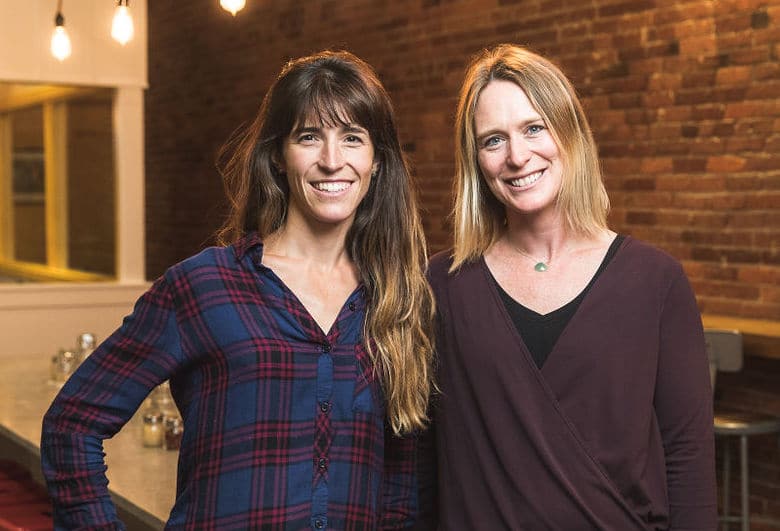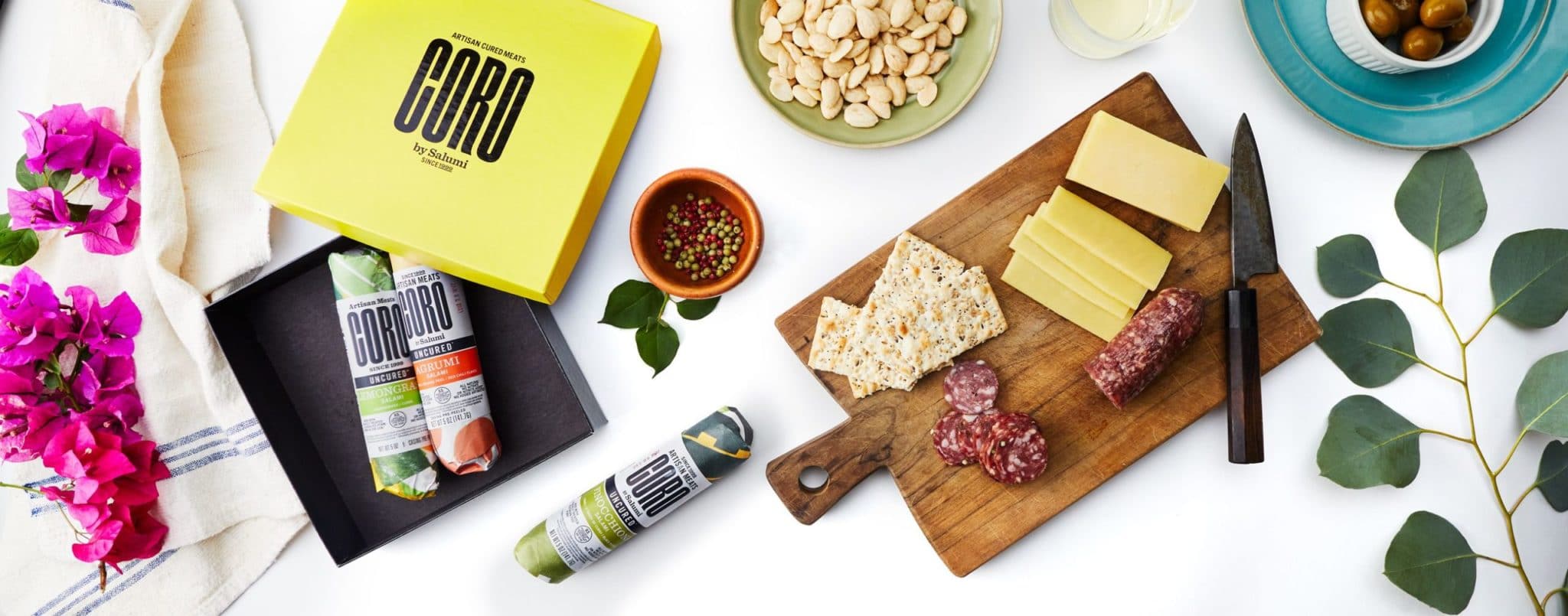
Eight months into a pandemic and Martinique Grigg, co-owner of Seattle’s famed Salumi, is grateful to finally be thinking ahead.
“It’s funny you ask that question,” she responded recently as we chatted over Zoom. “Just in the last few weeks, we’ve had a ton of conversations about it. We feel like we were in crisis mode and we’re now finally able to get our heads up.”
Like so many others in the food industry, Grigg and her fellow co-owner, Clara Veniard, have been immersed in the chaos of 2020. Only a few years into their ownership, the pair launched Salumi’s new sister brand, Coro Foods, at the tail end of 2019. The line of consumer-ready meats, encased in brightly-colored packaging inspired by Veniard’s love of jazz, trickled onto the market earlier this year just before everything started to seize up.
“It all came together as we launched the new facility,” explained Grigg in reference to the company’s expanded production space south of the city. “We really went public with Coro at the Fancy Food show in January.”
Thankfully, in June, things started to slowly come back, and they’ve come roaring back in the last couple of months. Now we’ve swung back to trying to ramp up our production. We’re being taken on by a number of accounts now – Whole Foods within the northwest, Raley’s in California, Williams-Sonoma, Crate & Barrel – so we’re happy to see we’re back on that trajectory, even if it’s a few months later than where we were supposed to be.
Everything Old Is New Again
Q: Did you have an opportunity to learn the Salumi business before officially taking over?
A: Martinique: We spent a year looking for opportunities in the area. We both have a business background with a focus on consumer goods. Clara suggested that we take those skills and create a new way to own and run a company. We’re deeply invested in the Seattle area because we both live here, so we were looking for a company specifically locally within food because it’s a passion for both of us. We wanted to create our own opportunity. There are a lot of men out there doing this, but there are not a lot of women.
We were introduced to Gina Batali and her husband, Brian D’Amato, through mutual friends. They were, at that point, looking to retire after running it for eight years following the purchase from the original owner, Gina’s dad, Armandino Batali. We hit it off, and they stayed on for another year and let us apprentice with them. We knew a lot about business, but we didn’t know anything about salumi making, so we became immersed. Even Armandino came back and was so gracious with his time. We worked in all parts of the business, from the deli to the production to the shipping, just to really learn it from the ground up.
Salumi making is really an art form. It’s like making cheese or wine. I think what was cool for us to learn was that there’s this Italian tradition of salumi making, but Armandino had also studied the Spanish traditions, along with some of the American techniques, and created his own proprietary way of salumi making. I think it really helped us solidify what our philosophy on salami and salumi making was going to be, which is to embrace it as an evolving art form rather than trying to achieve that classical take. Even in Italy, it’s always been this evolving tradition, even in different regions. Same products, but individual ways of producing it. So we’ve really embraced that, taking what Armandino has done and moving the needle along with our own spin on it. Especially as we’ve been able to hone in on what made it amazing and what we can add to that.
Q: How did the harassment allegations against chef Mario Batali influence business?
A: Martinique: That actually happened just a few months after we finally got through the transition.
Clara: Not even a month.
Martinique: The news broke, which was obviously devastating for the Batali family. Mario was never involved with Salumi, but it was still very difficult for the family to move through that. From our standpoint, we don’t operate that way. We took a strong stand pretty early on – not against the Batalis in any way, because it’s something the family has to work through – in regards to how we operate, iterating that that kind of behavior is not something that we tolerate. It’s not a culture that we’ve built, and I think if you talk to any of our employees, they would back that up.
Q: Was there an initial gasp of how to move forward?
A: Martinique: Of course, because not everybody knew that he’s not involved with the business. Thankfully, we only had a few wholesale accounts back then, and we only had one who pulled the product off the shelves, thinking that it was a product of his. But we made our case and made it clear that it was not a part of our business, and within twenty-four hours they had us back on the shelves. When people would bring it up to us, we always worked with them one-on-one to make it clear that it was not a part of our company.
Don’t you also think, Clara, that it really kicked off our conversation about what we wanted our legacy to really be? Because we were really in it for eight months or so. It kicked off this idea – okay, this is the old legacy, what do we feel is the true DNA of this company? How do we express that so that it’s really clear what we stand for?
So that was really how we arrived at Coro Foods – Coro is the Italian word for chorus – so as we focused on building a new production facility and going out and getting into wholesale with our own brand, we chose Coro because it’s both the unique flavors that we have and also the idea that there are multiple people who contribute to something to help it evolve. Also, there’s a team of people making it happen. It’s not all about us – it’s about our amazing staff and the super talented people in our production and our restaurant.
So I feel like the one silver lining to that situation was that it gave us the freedom to have those conversations and forced us in some ways to really clarify it for ourselves, giving us the strength to wear it boldly. Do you agree, Clara?
Clara: Oh, absolutely. It really liberated us. There was also a practical matter as far as transitioning to the Coro Foods brand. Salumi is a generic word – it’s the generic word for deli meats – so as a result, it caused a lot of confusion. People would send us photos of something in a store or on a menu and it would say ‘salumi’ and they’d be so excited thinking they found one of our products. But I’d have to say, “No, that’s just the word for meats.” We realized it was causing a lot of confusion and making it really hard for people to find what we truly made, so that also encouraged us to change.
Initially, when we started to look at making a change, we had been tiptoeing to some sort of name change or new brand for the wholesale side of our business, and I totally agree with Martinique that the whole experience early on with Mario really liberated us and allowed us to think even further than we probably would have.

The Launch of a Legacy
Q: And Coro Foods was born!
A: Martinique: We basically spent a year working with Salumi and really figuring the brand out, and then we started thinking about more production capacity. We knew that when Salumi did sell wholesale, it was relatively unbranded, so we saw that as an opportunity. We knew we needed more production space because we couldn’t fill the demand we had, so we spent that year building the new facility. And then last year, in 2019, almost a year ago today (“It is, right, Clara?! A year ago today!”) while we were building the facility, we were thinking about how we would want to express ourselves from a branding standpoint. It all came together as we launched the new facility. We really went public at the Fancy Food show in January.
Clara: And that’s another thing – so last year, we expanded our production capacity, which was a huge bottleneck previously. We thought about this new name which allowed us to prevent that confusion that we were facing and really emphasize that we wanted to become. And then that third thing, as Martinique alluded to earlier, there were also a lot of things that were important to us and how we make our product, so we actually made a ton of changes last year, continuing to stay true to the beauty of the flavors that everyone loves about Salumi, but we reviewed and updated all of our sourcing. So now, all of our meats are sourced from family farms with humanely treated, vegetarian-fed pork. We reviewed all of our spices so that all of our spices are sourced through local suppliers. Anything that wasn’t all-natural, we removed and replaced. We launched an uncured line using celery salt. There were a series of changes we made to the product to really reflect what we care about within the product that we eat.
Q: What was it like for you when the pandemic hit?
A: Martinique: When it first hit, I think everybody had a few months where we were thinking, “How bad is this going to get?” and we had the same thing. We had to close the restaurant, which is still a significant portion of our revenue. Our food service revenue went to almost zero, and we had been on this awesome trajectory of launching the brand and growing interest. We’re mostly in high-end grocery stores, and people were excited to add us. But all of that stopped because they were just trying to get toilet paper on the shelves!
So we were trying to figure out what was going to happen. Battened down the hatches and tried to put a plan in place that would allow us to survive, thinking it could go on for a long time. Thankfully, in June, things started to slowly come back, and they’ve come roaring back in the last couple of months. Now we’ve swung back to trying to ramp up our production. We’re being taken on by a number of accounts now – Whole Foods within the northwest, Raley’s in California, Williams Sonoma, Crate & Barrel – so we’re happy to see we’re back on that trajectory, even if it’s a few months later than where we were supposed to be.
Q: What are you hoping for the brands moving forward? Have you been thinking ahead or is it still day-to-day?
A: Martinique: It’s funny you ask that question because just in the last few weeks, we’ve had a ton of conversations about it. We feel like we were in crisis mode and we’re now finally able to get our heads up.
There are aspects, I will say, that are really rejuvenating about the brand. Food is about gathering and community and joy, and our food is also about exploration and fun and discovery. Playing with new flavors and being creative. Putting out your charcuterie board and sharing with people. Those moments are so few these days, but when you do have them, it’s wonderful. The fact that we get to play a small part in that is really inspirational. When we look at how to grow and grow responsibility. How to continue celebrating the Salumi tradition.
~Jennifer Matthewson
Photo credit: Coro Foods
